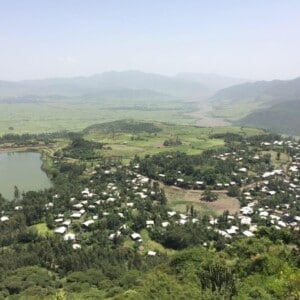Ethiopia’s Current Civil Conflict: Three Deaf People
By Krista Odom, WI-HER Program Coordinator

I arrived for the first time at my Peace Corps site in February 2016. My assigned counterpart loaded me up with my luggage and newly purchased mattress on a public transport van and jumped in. I did not speak the local language at the time and my counterpart spoke minimal English, but I did understand that there was an issue with the transport: we would not be able to get to the site using the transport van that had my mattress tied to the roof. I did not understand why or what the solution would be.
Then I arrived at the bottom of the mountain on the main road. Here a trail led up the side of the mountain and zigzagged through the stepped farmland for 2 kilometers on the road to Golbo, Amhara, Ethiopia. Transport by vehicles was not possible; instead my mattress and suitcase were tied to the side of a camel, and we would arrive on foot. At the time, the remote nature of my home for the next two years was a source of anxiety. But I felt reassured when I heard that Ethiopian Rebel Forces were heading down that same main road to the base of the mountain; I thought that Golbo would be spared from the ongoing conflict that has plagued Ethiopia for a year. However, when the dust settled and cell phone service was restored to the area, I learned that Golbo was not protected.
While I am not sure what is fact and what is fiction, I do know that the stories that I am hearing from the Amhara Ethnic group that populates Golbo are not unique to them. They are the same stories being told by the Tigrayan people also entrenched in the civil conflict. Human rights violations and ethnic killings have been reported since the beginning of the conflict.
The conflict reminds me of the Amharic Folktale, Three Deaf People, in which no one can hear the other, no one backs down, and no one wins. The conflict is a product of politics and historical tensions, but the victims of the conflict are disproportionately the poor.
Three Deaf People
One deaf farmer is ploughing and a deaf woman who has lost her sheep comes and asks if he has seen her sheep. She didn’t know he was deaf.
“Have you seen my sheep?”
He said, “What I am sowing from here to here is wheat.”
So she went following his pointing finger.
She found her sheep and gave one to the farmer out of thanks, but the gift sheep had a broken leg.
“Thank you for showing me my sheep and here’s one for you, with a broken leg.”
He said, “Please go away! Why are you stopping me working?”
She thought he was asking for another sheep.
Finally, she said, “No, take this one.”
And they didn’t agree and went to court.
The woman told her problem and so did he, but the judge was deaf, and said, “Whether you believe it or not, because the woman had a baby on her back, the baby is your son because he resembles you.”